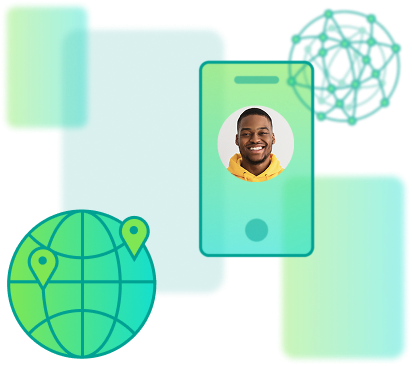Innovation
Leading-edge technologies powering the future of identity.





Patented biometric technology to combat advanced deepfake attacks.
Jumio’s most advanced biometric liveness detection uses patented active illumination and AI-driven analysis to outsmart deepfakes and injection attacks in real time. Randomized color sequences confirm human presence instantly, stopping spoofing before it impacts your business.





Presentation Attacks
Fraudsters use physical props or basic digital tricks to impersonate a real person. From paper printouts and black-and-white images to screen replays and even silicone or latex masks, these attacks attempt to fool biometric systems with staged presentations rather than genuine, live faces.




Occlusion & Absence
Biometric checks fail when the system cannot capture a clear, authentic face. This includes cases where the face is partially obscured, no face is present at all, multiple faces appear in frame, or even when fraudsters attempt to pass off images of sleeping individuals.


Synthetic & Morphing
Sophisticated fraudsters generate entirely new identities or alter real ones using AI and image manipulation. This includes advanced synthetic images designed to look authentic and face or head swaps crafted to trick identity verification systems.





Injection & Replay
Rather than presenting a face to the camera, fraudsters target the system itself. By using replay attacks, injection of fake data streams, or digitally injected ID fraud, attackers attempt to bypass biometric capture entirely and feed manipulated data directly into the pipeline.
Learn about deepfakes and strategies to protect against them.

Connected intelligence to uncover trust and risk others can’t see.
Jumio’s Identity Graph unites millions of data points into a single source of truth, revealing patterns and connections that go far beyond a single transaction. By analyzing cross-transaction risk, we detect fraud that slips past isolated systems.
The next evolution is already underway with dynamic trust scores and real-time insights powered by identity reputation, graph intelligence, and breach data. Proactive, interactive tools to monitor identity profiles, reveal new suspicious associations, and surface explainable risk signals are launching soon. Delivering an unmatched level of continuous identity intelligence to power business evolution.

Powering the fast and flexible digital identity evolution.
As governments and trusted issuers roll out digital IDs worldwide, identity is becoming portable, secure, and instantly verifiable — reshaping everything from account onboarding to age verification to government services. Jumio is at the forefront of this shift, uniting eIDs with advanced identity intelligence to deliver instant trust without friction. The Jumio platform helps organizations stay ahead, meeting the strictest compliance requirements and streamlining onboarding — turning regulatory necessity into competitive advantage.

Accelerating the onboarding journey with just a selfie.
Imagine onboarding where identity is verified once and trusted everywhere. Powered by the Jumio Identity Graph of millions of verified identities, our reusable identity framework lets businesses instantly recognize returning users with just a selfie. By leveraging historical biometrics, previously verified documents, and real-time identity intelligence, organizations can confirm legitimacy in seconds while keeping fraudsters out. With cross-organization consent and insights from both trusted users and known fraud attempts, Jumio is redefining how trust moves across the digital economy.